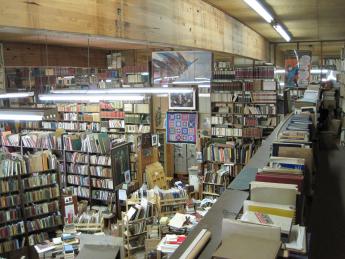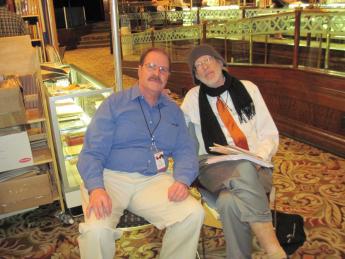Tribute, Part 3

Part 3
“the biblical prophet...”
By David Mason
I have known Peter Howard for some forty years, during which time, along with many, many book transactions, we have had countless disagreements, confrontations and fights. Many of these originated from his strong convictions about loyalty to friends – in particular his friend, and my nemesis, William Hoffer.
In spite of all my confrontations with Peter, I greatly admire his style and his capacities as a bookseller and have often referred to him – once in print – as being the bookseller who I consider to be the best bookseller of my generation. This contention caused serious opposition from some who had different views; other worthy dealers, in other fields, would be nominated, and I would have to concede that perhaps those opposing views had some merit. Admitting that, I would then add that perhaps I should have qualified my statement by saying the best in the field he dealt in, modern literature.
But in truth I meant it. I believe that Peter would have excelled in whatever field he chose to deal in because he had all the attributes that I believe are shared by all true booksellers.
First, reverence for the book and its importance as a worthy cultural artifact; next the supremacy of the dealer as arbiter of the standards of collecting and the moral imperative to convey those standards to others. And perhaps, his most admirable trait, his understanding of the importance of other dealers to the trade. His love of selling to the trade and his generosity in his dealings with his colleagues is well known and, I’m sure, the accounts found here will reflect many instances of this.
My favorite Peter anecdote – and there are plenty to choose from – relates to a personal incident. And I also think it is a wonderful example of a creative insult. It also reflects his character and the very different manner with which he viewed the trade and our relations with other dealers. Once, at a bookfair during one of our intermittent periods of strife, I returned to my booth to find Peter’s card in a book. I was a bit surprised because we weren’t speaking just then. While I no longer remember the nature of that particular fight, I was surprised to find that he had been in my booth, since my own method of dealing with colleagues I am angry at is to not buy any books from them. But I invoiced the book, deducting the normal trade discount and sent the book to Peter’s booth. Later that day my invoice was returned, with the discount crossed out and the full price of the book paid by cheque. Across the invoice, in large printed letters, read “DISCOUNT REFUSED.” I admired the classy nature of that deliberate insult then, and I still do. What a wonderful insult, I thought, expressing your contempt for a colleague by refusing to accept a traditional courtesy of the trade.
I’m sure he bought the book based on his oft-trumpeted credo of “serving the customer.” He did not allow his professionalism and duty to his client to be affected by our disagreement, and by refusing the usual trade amenity, found a way of putting me in my place.
When we were all younger I envied Peter his apparent certainty at the rightness of his own views; he always had an instant answer which he would throw in your face in the manner of some biblical prophet. Years later I saw a short bio somewhere which stated that one of his majors in University had been Biblical Studies. Aha! I thought – that’s the key to Howard; the biblical prophet; the man whose vision, fueled by passion, drives him to exhort and lecture; the man who has the truth and who is compelled to pass it on. Like several booksellers I’ve known he seemed to have transferred his religious impulses to his vocation.
I still consider Peter to be one of the greatest of American booksellers. We know Kraus and Rosenbach could sell great books, but there are lots of great salesmen around. What’s needed are more philosophers.
Peter’s ideas and actions influenced many, not just booksellers. I’m sure many collectors and librarians have also benefited by listening to his pronouncements.
He made his mark in his time and if he was not always easy to deal with, well, that seems to go with greatness. I would sometimes admonish Peter for not listening to my pronouncements, claiming he should be more respectful of his elders. I am exactly one day older then him. But that didn’t happen. Another example of the man who follows his own vision.
I learned plenty from him and if much of it came from my own efforts to confute those of his certainties I didn’t like, or couldn’t accept, that doesn’t lessen his impact.
I often welcomed the 3000 miles which separated us, but I’m glad I knew him and I continue to admire him.
Men like Peter Howard are the ones who change the world.
He will be remembered.

“the great catalyst...”
By James Pepper
Growing up in Southern California, I started riding my bicycle to bookstores at the age of fourteen. By the fall of 1970, I was eighteen years old, a freshman in college, and crazy about books. While walking through my college library I saw a poster for the ABAA Antiquarian Book Fair being held at the now lost Ambassador Hotel in Los Angeles.
Somehow I managed to drag my girlfriend to it convincing her it would be a fun date. As I recall she actually had a good time but I was enthralled. It was amazing that dealers would put famous books or George Washington and Ernest Hemingway letters into my hands. There were so many things I would have loved to own but had little money. My one purchase was a $15 copy of the Wimp Press piracy of Bob Dylan’s book, Tarantula, which at that point Dylan had not allowed to be published. The booth was Serendipity Books and I met the remarkable Peter B. Howard, little knowing that the encounter would contribute to my one day becoming a bookseller.
One of God’s more complex creatures, Peter is the very definition of the word mercurial. Quirky as he can be, Peter has always personally treated me with great courtesy. I have many times been the recipient of his kindness. I once found he had a moderately expensive book that I wanted to buy for my personal collection. I sheepishly asked him if I could have a little time to pay for it, thinking that maybe that 60 or 90 days would be quite nice. Peter looked at me and said “What do you need, two years, three years?”
A quarter of a century ago, knowing that I personally collected cinema in a serious way, Peter sold me Orson Welles’ working manuscripts for the screenplay of his classic film, Touch of Evil, now one of the great highlights of my collection. He charged me $10,000 and gave me a year to pay. But with Peter you knew that if you got in trouble he would give you more time.
Peter takes great pride in saying that Serendipity Books has never charged for shipping. Uniquely, Peter has taken that saying to new levels. For years when there have been book fairs in San Francisco, Peter would encourage dealers to send their boxes of books for the fair to Serendipity. He would store them, then at the time of the fair he would rent a truck, take them to the venue and have them delivered to your booth. When there were ABAA fairs in Los Angeles. Peter would rent trucks and drive south the boxes to supply many booths of those dealers from Northern California. All this for free.
I have always thought of Peter as the Great Catalyst. He has this peculiar genius for obtaining and selling books. Many dealers over years have had a large number of items supplied for their businesses through their repeated scouting of the store. He has encouraged a good number of young booksellers, some of whom are now considered the established old guard. I have seen him go to great lengths to find things for collectors. After years of selling modern literature only, Peter decided to take a new look at things and expanded his business to embrace all kinds of interesting non-fiction areas. Serendipity Books is a place where a hyper-modern collector can find an esoteric piece of poetry or an incunabula dealer from Holland finds an historical treatise from the1490s.
One of the various sub-definitions of the word “serendipity” is noted as “someone useful found by accident.” Peter Howard is much more than someone merely useful.
“the minotaur…”
By Ken Sanders
Serendipity Books of Berkeley, California is a zen koan of a book shop, and its proprietor, Peter B. Howard, is the minotaur at the heart of the labyrinth. Or perhaps a reverse labyrinth, as Mr. Howard’s desk is situated at the far end of the great two story room as one first enters Serendipity and flanked by two runs of large towering bookshelves set in a sort of isosceles triangle, yet open at both ends, so as to funnel both your eyes and your body towards the minotaur himself: Peter B. Howard. Like the oracle at Delphi, one must pass through these portals and be prepared to answer the riddle of the sphinx. Many have failed these initial tests, or quests, and have likewise failed to learn any of the secrets that lay beyond.
Peter B. Howard was to the bookselling of the 1960s as Orson Welles once was to film of the 1930s: A brilliant and arrogant mind that does not suffer fools lightly. As the great Berkeley and Serendipity scholar, Ian Jackson, once wrote in his brilliant series of treatsies on Peter B. Howard and Serendipity Books ("The Key To Serendipity or How To Buy Books from Serendipity" and “The Key To Serendipity Or How To Find Books In Spite of Peter B. Howard”) a question best not posted to Mr. Howard in any of its myriad forms is ”Are these books in any kind of order?” because, in Mr. Howard’s mind, the only place they reside in any sort of order or organization is in Mr. Howard’s mind and nowhere else.
The Zen koans are alive and pulsating throughout every rolling stack and every nook and cranny but are ordinarily invisible to those mere mortals of booksellers who make it past the initial Serendipity fulcrum and the minotaur himself and wade off into the heart of darkness or the river Styx without oars or illumination. Pity that Mr. Jackson never finished the map; the integral third volume which shall evermore rank, along with Aristotle’s Lost Poetics, and the other unknown volumes that burned in Alexandria, as one of the great lost books of all time.
Peter B. Howard bears a remarkable resemblance to the crotchety old bookseller in Michael Ende’s The Never Ending Story - “Your books, are safe, my books are real” - and his premises are probably the closest I’ve seen to those in the library labyrinthe in the filmed version of Umberto Eco’s “The Name of the Rose," although I have yet to encounter any arsenic-laced incunabula except, perhaps, from the tongue of the proprietor. And Serendipity is the operative word for both the premises; in their vast inventories and ever changing denizens. The minotaur himself and his long suffering assistant, Nancy Kosenka, are the only two constants in this ever evolving and serendipitous landscape. And those premises are a bit like the various lands of Oz, although not nearly as neatly ordered and likely full of a lot more surprises.
Prospecting the shelves and the vast inventories of Serendipity is a daunting task for the uninitiated or the lone prospector. But there is gold in them there hills, or more precisely in the thousands of “sacks” overflowing the aisles and floors that denote the newest of arrivals to the Serendipity landscape. Acquiring books from Mr. Howard is an arduous and detailed process and not for the faint of heart and I don’t have time to attempt an explanation of that process here. Again I would refer the neophyte to Mr. Ian Jackson’s articulations of the Serendipity experience contained in his two published volumes about Peter B. Howard and Serendipity Books.
But what I wish to say is that Peter B. Howard is one of the most generous and knowledgeable men that has ever lived in the world of books. He has an astonishing mind and intellect and passion for books that is only matched by his equally intimidating arrogance, superiority, eccentricity, and furor in the trade. He is simultaneously one of the most beloved, admired, feared and disliked individuals that ever plied the world of books. He has acquired and articulated and sold some of the most important collections and archives in the second half of the 20th century in the book world, and hundreds of booksellers are the richer for his legendary largess in the trade; both in spirit and pocketbook. I know that my own acquaintance with Mr. Howard and Serendipity Books has been an unforgettable experience and I am the richer for it.
Peter B. Howard is the architect of Serendipity and it has been a willful and determined construction over the past half century, that is and always will be a work in progress. By necessity and his own volition, Serendipity Books cannot and will not outlive its creator. The minotaur is on his own final journey into the very heart of the zen koan labyrinth maze of his own making. Would that he would be able to report back to us what he finds when he finally gets to where he’s going.

Booktryst thanks Dan Adams, John Baxter, Taylor Bowie, John Crichton, Mary Gilliam, Ed Glaser, Eric Korn, John Martin, David Mason, James Pepper, Ken Sanders, Charles Seluzicki, Ralph Sipper, Martin Stone, Michael R. Thompson, Jeff Towns, and Vic Zoschak for their contributions.
A special thank you to James Pepper and John Crichton for their assistance with getting this project off the ground. Very special thanks to James Pepper and Ralph Sipper for their ongoing encouragement and support.
Part 3 of A Wake For The Still Alive was posted on Booktryst, in August 2010, and is presented by permission of Stephen J. Gertz.
David Mason is the proprietor of David Mason Books in Toronto, Canada. James Pepper is the proprietor of James Pepper Rare Books in Santa Barbara, CA. Ken Sanders is "creating chaos out of anarchy for a better tomorrow" at Ken Sanders Rare Books in Salt Lake City, UT.
